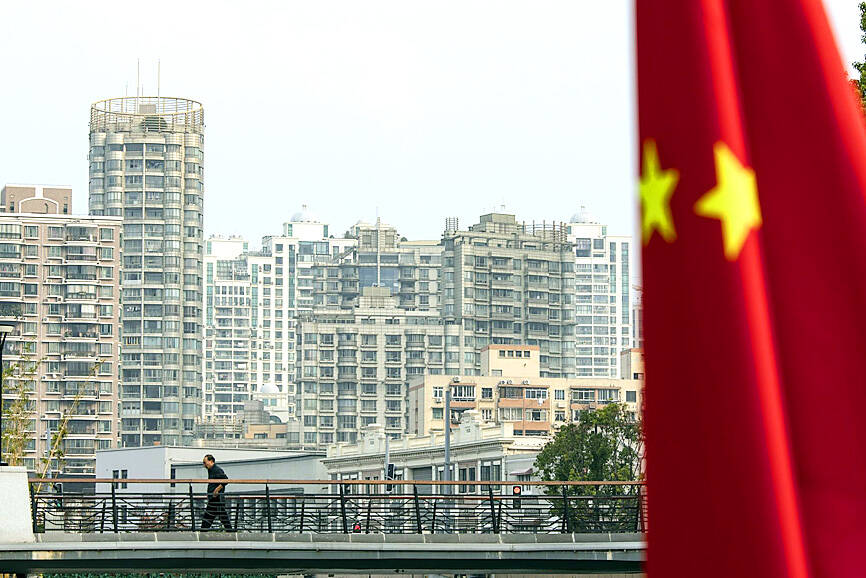Chinese authorities have unveiled sweeping measures to rescue its struggling property sector, as regulators seek to offset years of harsh COVID-19 pandemic curbs and a real-estate crackdown that have stalled the world’s No. 2 economy.
China’s banking regulator and central bank on Friday issued a 16-point set of internal directives to promote the “stable and healthy development” of the industry, which were reported by Chinese state media yesterday.
The measures include credit support for debt-laden housing developers, financial support to ensure completion and handover of projects to homeowners, and assistance for deferred-payment loans for homebuyers.

Photo: Bloomberg
That came on the same day the Chinese National Health Commission issued 20 rules for “optimizing” Beijing’s “zero COVID” policy, where certain restrictions were relaxed to limit its social and economic impact.
“We view this as the most crucial pivot since Beijing significantly tightened financing of the property sector,” Nomura Holdings Inc chief China economist Ting Lu (陸挺) wrote in a note. “We believe these measures demonstrate that Beijing is willing to reverse most of its financial tightening measures.”
Hong Kong stocks surged more than 3 percent yesterday, extending Friday’s rally of more than 7 percent the measures were unveiled.
Beijing imposed widespread lending curbs on property developers in 2020, which exacerbated their liquidity issues and caused several of the largest to default on bond payments.
The knock-on effects on the massive real estate sector were severe, with cash-strapped developer Evergrande Group (恆大集團) — China’s largest — and others failing to complete projects, sparking mortgage boycotts and protests from homebuyers.
The measures emphasized “guaranteeing the handover of buildings,” and ordered development banks to provide “special loans” for the purpose, according to a document circulating online.
It orders financial institutions to treat state-owned and private real-estate enterprises equally, as well as “actively cooperating with distressed real estate enterprises in risk management.”
The measures also include “extending the transition period arrangements... of real-estate loans” for distressed developers, and support for “high-quality real-estate enterprises to issue bond financing.”
“The plan includes financial stability measures that aim to prevent massive defaults and hence provide a ‘soft landing,’” Australia and New Zealand Banking Group Ltd analysts wrote in a note.
However, they also said these changes — alongside limited loosening of “zero COVID” measures — would not cause an immediate recovery for the ailing sector.
“While not many are expecting a financial crisis caused by the current property downturn, the mainstream view is that the property sector would stay weaker for longer. Therefore, the worst is far from over for developers,” Macquarie Securities Inc economist Larry Hu (胡偉俊) wrote in a note.
Prices of new homes have been falling for more than a year, while demand is struggling to pick up owing to ongoing strict pandemic controls that have dampened consumer confidence.

The demise of the coal industry left the US’ Appalachian region in tatters, with lost jobs, spoiled water and countless kilometers of abandoned underground mines. Now entrepreneurs are eyeing the rural region with ambitious visions to rebuild its economy by converting old mines into solar power systems and data centers that could help fuel the increasing power demands of the artificial intelligence (AI) boom. One such project is underway by a non-profit team calling itself Energy DELTA (Discovery, Education, Learning and Technology Accelerator) Lab, which is looking to develop energy sources on about 26,305 hectares of old coal land in

Taiwan’s exports soared 56 percent year-on-year to an all-time high of US$64.05 billion last month, propelled by surging global demand for artificial intelligence (AI), high-performance computing and cloud service infrastructure, the Ministry of Finance said yesterday. Department of Statistics Director-General Beatrice Tsai (蔡美娜) called the figure an unexpected upside surprise, citing a wave of technology orders from overseas customers alongside the usual year-end shopping season for technology products. Growth is likely to remain strong this month, she said, projecting a 40 percent to 45 percent expansion on an annual basis. The outperformance could prompt the Directorate-General of Budget, Accounting and

Netflix on Friday faced fierce criticism over its blockbuster deal to acquire Warner Bros Discovery. The streaming giant is already viewed as a pariah in some Hollywood circles, largely due to its reluctance to release content in theaters and its disruption of traditional industry practices. As Netflix emerged as the likely winning bidder for Warner Bros — the studio behind Casablanca, the Harry Potter movies and Friends — Hollywood’s elite launched an aggressive campaign against the acquisition. Titanic director James Cameron called the buyout a “disaster,” while a group of prominent producers are lobbying US Congress to oppose the deal,

Two Chinese chipmakers are attracting strong retail investor demand, buoyed by industry peer Moore Threads Technology Co’s (摩爾線程) stellar debut. The retail portion of MetaX Integrated Circuits (Shanghai) Co’s (上海沐曦) upcoming initial public offering (IPO) was 2,986 times oversubscribed on Friday, according to a filing. Meanwhile, Beijing Onmicro Electronics Co (北京昂瑞微), which makes radio frequency chips, was 2,899 times oversubscribed on Friday, its filing showed. The bids coincided with Moore Threads’ trading debut, which surged 425 percent on Friday after raising 8 billion yuan (US$1.13 billion) on bets that the company could emerge as a viable local competitor to Nvidia